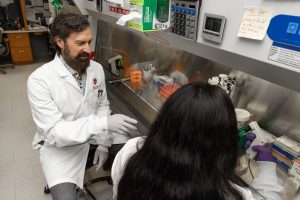
The Brown Lab, led by Matthew E. Brown, PhD, assistant professor in the Division of Transplantation, recently published an article describing its new approach to “hypoimmune” gene editing of pluripotent stem cell (PSC) therapies. The article, titled “Diminished Immune Cell Adhesion in Hypoimmune ICAM-1 Knockout Pluripotent Stem Cells,” was published on the prestigious open access journal Nature Communications.
This work — supported by WARF Accelerator — involved the use of CRISPR/Cas9 gene editing to “knock out” a critical gene that immune cells use to bind to transplanted cells. Immune cell adhesion/binding is a key first step in the inflammatory response that often leads to cell death and rejection following transplantation, so this new approach has tremendous potential as a promising new class of PSC cellular therapy for preventing rejection.
The current focus of the research team is on cardiovascular therapies, like for myocardial infarction, but this new hypoimmune strategy has the potential to benefit a number of other types of PSC-related cellular therapies, such as for diabetes, Parkinson’s disease, and other diseases.
The Brown Lab hopes to expand this research to develop additional hypoimmune approaches, as well as to use this technology to help people with Down syndrome. Dr. Brown and the Wisconsin Alumni Research Foundation (WARF) are seeking industry partners to help bring this promising innovation to market.